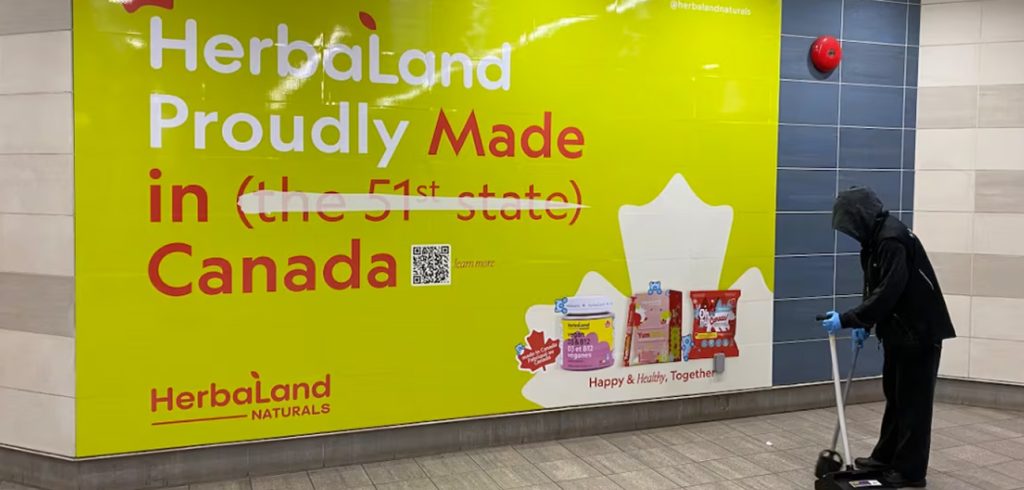- March 20, 2025
- 0 Comments
- By MelangeMC
In marketing, bold ideas often win attention. However, when politics enters the creative mix, that same boldness can quickly backfire. Corporate brands typically stay away from political references in their campaigns for good reason: politics is inherently divisive. It can agitate or alienate groups that include your customers, partners, or employees.
That’s why we generally don’t recommend using political references in advertising unless they are absolutely necessary, appropriate, and authentically on brand, not just riding a trend or a “hot topic.” Some campaigns have successfully used political or national references to spark dialogue or convey values, while others have stumbled badly by misreading their audience.
When Political References Work
Done thoughtfully, political or national themes can be clever, unifying, or even inspiring. Heineken’s “Worlds Apart” campaign brought people with opposing political views together over a beer, highlighting conversation and empathy instead of division. It earned praise globally for humanizing disagreement.
A classic Molson Canadian commercial from March 2000 took a similar approach to national pride — this time with a distinctly Canadian twist. Starring actor Jeff Douglas as “Joe,” the ad became an instant hit as part of the “I Am Canadian” campaign. Timed with the NHL playoffs that year, the monologue-driven spot celebrated Canadian identity with humour, confidence, and heart, earning the Gold Quill Award in 2001.
The “I Am Canadian” slogan struck a chord with audiences in both Canada and the United States. It was patriotic without being political, a rallying cry that turned self-awareness and good-natured national pride into marketing gold.
After Molson’s merger with Coors in 2005, the campaign was retired, but its legacy remains one of the most memorable examples of national identity done right in advertising.
These examples share one thing in common: they connect to universal human values such as humour, empathy, and shared pride rather than taking a side in a contentious political issue.
When It Crosses the Line
In March 2025, Richmond, BC–based supplement manufacturer Herbaland faced backlash over a billboard that referenced the “51st state.” The ad appeared to allude to former U.S. President Donald Trump’s rhetoric about the United States “absorbing” Canada as its 51st state, a notion occasionally joked about online but politically charged and not part of any serious public discourse within Canada.
Herbaland’s intent was apparently to emphasize that its nutraceutical products are Made in Canada, a message of national pride. However, the creative execution missed the mark. The billboard’s design featured the phrase “51st State” with a white line striking through it, meant to convey “we’re not America.” Yet visually, the effect was ambiguous: some viewers even thought the strike-through had been added later as vandalism or protest, rather than as part of the original ad.
The result was confusion and discomfort. In a liberal, multicultural metropolitan like Vancouver, where residents are especially attuned to political overtones, the campaign felt needlessly provocative. What may have seemed like a cheeky, patriotic statement internally instead came across as antagonistic and politically tone-deaf to the public.
Why It Wasn’t Acceptable
The “51st state” idea isn’t a shared cultural joke in Canada. It’s a fringe concept associated with U.S. political swagger. Referencing it on a high-traffic public billboard felt less like national pride and more like stirring a pot no one wanted stirred.
Technically, the ad’s ambiguity also contributed to the backlash. The crossed-out typography, though intended as a rejection of the idea, visually resembled defacement, as if someone else had “corrected” or censored the message. This design flaw only deepened confusion about the brand’s intent.
More importantly, the controversy underscored a broader lesson: context is everything. In a metropolitan as diverse and politically aware as Vancouver, audiences are quick to pick up on tone and implication. A line that might seem clever in one setting can feel divisive or disrespectful in another.
While Herbaland’s marketing team is young and ambitious, this incident shows why politically tinted messaging requires seasoned judgment. Unless your brand has a strong creative team with experience navigating sensitive narratives, it’s best to steer clear of political themes entirely.
How We Help Brands Navigate These Lines
At Melange Marketing Communications, we help brands thrive in cross-cultural environments by ensuring their messages resonate instead of backfire. From market research and localization to cultural consulting and bilingual creative, we identify the subtle meanings that can make or break a campaign.
We believe great marketing doesn’t just travel. It translates.
“Every market has its own language — not just in words, but in values, history, and humour. Understanding that is where cultural strategy meets creative success.”






